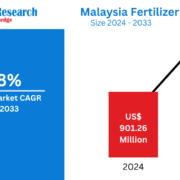Malaysia Fertilizer Market Set for Strong Growth Driven by Agricultural Modernization and Sustainable Practices – Renub Research
According to the latest study by Renub Research, the Malaysia Fertilizer Market is poised for steady growth in the coming years. Factors such as the country’s ongoing agricultural modernization, rising demand for food security, government initiatives promoting sustainable farming, and technological innovations in fertilizer production are driving this growth. The detailed analysis in the Renub Research Malaysia Fertilizer Market report offers insights into the market’s size, key trends, growth drivers, challenges, segmentation, and forecasts shaping the future of Malaysia’s fertilizer industry.
Fertilizers: A Vital Component of Malaysia’s Agricultural Success
Agriculture remains a significant contributor to Malaysia’s economy, and fertilizers play a critical role in enhancing crop productivity and soil health. As the nation focuses on ensuring food security and reducing its reliance on imports, the adoption of fertilizers—both chemical and organic—has become integral to boosting yields and meeting growing domestic and export demands.
The Malaysian government continues to support the sector through subsidies, training programs, and policies that encourage the balanced and efficient use of fertilizers. Farmers are increasingly adopting precision farming techniques that incorporate nutrient management, further stimulating the demand for advanced fertilizer solutions.
Key Drivers Propelling the Malaysia Fertilizer Market
Several factors are contributing to the rising demand for fertilizers in Malaysia:
- Agricultural modernization: The shift towards mechanized farming and precision agriculture is boosting the adoption of high-quality fertilizers to optimize productivity.
- Sustainability goals: Malaysia’s commitments to environmental sustainability and reducing greenhouse gas emissions are driving interest in eco-friendly and slow-release fertilizers that minimize leaching and environmental impact.
- Palm oil and cash crop expansion: Malaysia, one of the world’s leading palm oil producers, relies heavily on fertilizers to maintain high yields and oil extraction rates. The cultivation of other commercial crops like rubber, cocoa, and fruits also fuels fertilizer consumption.
- Government support: Subsidies, grants, and research initiatives that promote fertilizer use and soil health improvement continue to stimulate market growth.
Technological Innovations Shaping the Future
Malaysia’s fertilizer market is witnessing technological transformations that aim to enhance efficiency, reduce waste, and minimize environmental harm. Manufacturers are focusing on:
- Controlled-release and slow-release formulations: These fertilizers provide nutrients over extended periods, reducing application frequency and nutrient loss.
- Bio-fertilizers: The growing popularity of organic farming and integrated nutrient management is leading to increased demand for bio-fertilizers that improve soil microbial activity and fertility.
- Customized nutrient blends: Precision agriculture tools are enabling tailored fertilizer recommendations based on soil health assessments, ensuring crops receive the exact nutrients they need.
These innovations are helping farmers improve yields while aligning with Malaysia’s sustainability targets.
Segmentation: Diverse Fertilizer Types Meeting Varied Needs
As analyzed in the Renub Research report, the Malaysia fertilizer market can be segmented into:
- By type: Nitrogenous fertilizers, phosphatic fertilizers, potash fertilizers, compound (NPK) fertilizers, organic fertilizers, and specialty fertilizers.
- By crop type: Fertilizer use varies across oil palm, rubber, paddy rice, fruits, vegetables, and other cash crops.
- By application method: Fertilizers are applied through broadcasting, fertigation, foliar application, and other modern techniques depending on crop type and regional practices.
Among these, nitrogenous and compound fertilizers remain the most widely used in Malaysia, especially for large-scale commercial farming.
Challenges Facing the Malaysia Fertilizer Market
Despite positive growth trends, the fertilizer sector in Malaysia faces certain challenges:
- Environmental concerns: Excessive or improper fertilizer use can lead to water pollution, soil degradation, and biodiversity loss.
- Price volatility: Fluctuations in global raw material prices and supply chain disruptions can impact fertilizer availability and cost for farmers.
- Dependence on imports: A significant share of Malaysia’s fertilizer requirements is met through imports, making the sector vulnerable to international market dynamics.
Addressing these challenges through better nutrient management, local production capacity expansion, and stronger policy frameworks will be crucial to ensuring long-term market stability.
Competitive Landscape: Focus on Innovation and Sustainability
Malaysia’s fertilizer market is characterized by a mix of local manufacturers, multinational companies, and agricultural cooperatives. Key players are focusing on:
- Product innovation: Developing fertilizers that align with sustainability and efficiency goals.
- Strategic partnerships: Collaborating with research institutions and government agencies to promote best practices in fertilizer use.
- Expanding distribution networks: Ensuring timely and widespread availability of fertilizers, particularly in rural and underserved farming areas.
The competitive landscape is increasingly shaped by the demand for environment-friendly and high-performance products that meet evolving farmer and regulatory expectations.
Future Outlook: A Promising Growth Trajectory
As highlighted in the Malaysia Fertilizer Market report by Renub Research, the sector is expected to grow steadily in the coming years. The combination of technological advancements, rising demand for food security, sustainability initiatives, and government support will continue to drive the market forward.
Future trends are likely to include:
- Greater adoption of precision agriculture: Leveraging digital tools for efficient nutrient management.
- Expansion of organic and bio-fertilizers: Meeting consumer demand for organic produce and environmentally responsible farming.
- Local manufacturing investments: Reducing reliance on imports and enhancing national food security.
The Malaysia fertilizer market is well-positioned to play a pivotal role in supporting the nation’s agricultural productivity, environmental goals, and economic resilience.
New Publish Report:
- Japan Cancer Diagnostics Market – Screening Technologies & Forecast 2025–2033
- Japan Plant-Based Meat Market Size and Share Analysis – Growth Trends and Forecast Report 2025-2033
- Japan Leather Goods Market Size and Share Analysis – Growth Trends and Forecast Report 2025-2033
About the Company
Renub Research is a Market Research and Consulting Company with more than 15 years of experience, especially in international Business-to-Business Research, Surveys, and Consulting. We provide a wide range of business research solutions that help companies make better business decisions. We partner with clients across all sectors and regions to identify their highest-value opportunities, address their most critical challenges, and transform their businesses. Our wide clientele includes key players in Healthcare, Travel & Tourism, Food & Beverages, Power & Energy, Information Technology, Telecom & Internet, Chemicals, Logistics & Automotive, Consumer Goods & Retail, Building & Construction, and Agriculture. Our core team comprises experienced professionals with graduate, postgraduate, and Ph.D. qualifications in Finance, Marketing, Human Resources, Bio-Technology, Medicine, Information Technology, Environmental Science, and more.
Media Contact
Company Name: Renub Research
Contact Person: Rajat Gupta, Marketing Manager
Phone No: +91-120-421-9822 (IND) | +1-478-202-3244 (USA)
Email: rajat@renub.com



Leave a Reply
Want to join the discussion?Feel free to contribute!